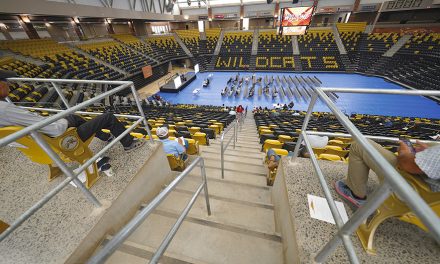
Standing up for Diné businesses: Dineh Chamber unveils $100M plan for ARPA funds

WINDOW ROCK
The Dineh Chamber of Commerce has put forth a bold, $100 million proposal to assist the Division of Economic Development in the administration of the American Rescue Plan Act funds with distribution to tribes expected in May.
The chamber envisions it can help Navajo businesses benefit from ARPA, which contains the largest ever funding package for Indian Country, totaling $31.2 billion, including $20 billion directly to tribal governments to mitigate the health and economic impacts from the COVID-19 pandemic.
“The American Rescue Plan Act of 2021 is going to provide significant dollars, an unheard-of amount, and we’re all grateful for that,” said finance and economic development consultant Derrick Watchman, a member of the chamber and owner of Sagebrush Hill Group.
Watchman, who presented the proposal on behalf of the chamber, reported that ARPA funds can be used to help individual households, small businesses, nonprofits and provide aid to industries hit hard by the COVID-19 pandemic, such as tourism, travel, and hospitality, and support infrastructure investments.
In its role as a nonprofit that advocates for Navajo small businesses, the chamber itself is eligible to receive ARPA funds to help guide the businesses it serves.
The overall mission of the chamber, led by Board Chairman Jeff Begay, is to give Navajo businesses support to succeed through private sector growth and policies, laws and opportunities that support a business environment.
Collaboration between the Navajo Nation and business development entities will be important when administering ARPA funds, Watchman advised Navajo Nation Council delegates at a DED work session last week.
“No one single entity can handle all of the economic development, community development, and business development,” he said. “This is a huge task that all of us together have to address.”
Watchman believes the estimated 6,346 Navajo owned businesses that represent just about every sector should be considered for work generated through ARPA projects, especially since many of them suffered revenue reductions and job losses due to the pandemic.
“We’re here to support our Navajo businesses that have an abundant, capable, skilled workforce,” he said. “We have qualified Navajo business owners that can provide any and all services.”
He said it is important to support micro businesses such as food and arts-and-crafts vendors who saw financial hardship due to public health emergency closures that have shut down flea markets, tribal parks and other tourism attractions.
Watchman said instead of being upheld and sought after, many Navajo businesses receive feedback that they are not qualified or capable enough and lack financial backing.
Furthermore, the Navajo Business Opportunity Act is not honored or enforced, said Watchman, and with outside banks not lending to Navajo-based businesses, there is limited capital to foster growth.
That lack of capital is one of the biggest challenges Navajo businesses and the Nation face in growing the economy, he said.
The chamber believes it’s time to “stand up” and support Navajo-owned businesses and encourage them to participate in the economic expansion that could be harnessed through ARPA.
“Only through collaboration will we be able to successfully grow our own,” said Watchman. “We’d like to see all of our 6,000 Navajo businesses with a contract and the ability to be a part of the ARPA.”
The Dineh Chamber proposes a $100 million “action plan” to accomplish that, which contains:
• $25 million Loan Guarantee Fund, a credit support program to enable Navajo businesses to secure loans.
• $10 million Performance Bond Fund to help businesses secure bonding.
• $9 million Navajo Executive Corps Program to connect Navajo business owners with professional advisory services.
• $5 million grant writing corps to provide grant-writing services to Navajo businesses.
• $24 million Navajo Economic Recovery Centers located in each agency at Navajo Shopping Centers.
• $15 million Navajo Opportunity Zone Fund to draw seed capital investors.
• $7 million for a Feasibility Studies Program to support business assessments often needed for loan approvals.
• $5 million for administration and support for contract and project management, accounting, auditing, compliance, legal, marketing, and telecommunications services.
“With the program we are presenting, we will make sure our Navajo businesses are ready to get the job done,” said Watchman. “We believe we can grow and enhance a sustainable, healthy, robust Navajo economy.”
Watchman said implementation of the chamber’s action plan can help shore up qualification gaps for Navajo-owned businesses, increase access to capital, reduce “economic leakage” to border towns, expand pathways to “Buy Navajo, Buy Local,” strengthen partnerships between the Navajo public and private sectors, attract commerce and industrial development, and help use funds at the local level.
“It’s our goal with ARPA that as each of those dollars is spent those contracts are done through our Navajo businesses,” said Watchman. “By doing so, the money is kept on the reservation. That’s how you build economy and create jobs, revenues, and sales tax.”
The chamber is already in discussions with DED, other regional chambers of commerce, the Change Labs business incubator, Navajo Technical University, Diné College and Navajo Community Development Financial Institution to plan out ARPA services.
“We all agree that we have to work together,” said Watchman. “It’s important for us to collaborate. If we don’t, we may not be as successful as we can.”
In order for the chamber’s $100 million plan to be approved, it will need the support of the Navajo Nation Council and the president’s office.
“This will help to stand up our Navajo businesses,” said Watchman. “We need the support of our leaders and our government.”
Information: www.dinehchamber.org







 Highway 264,
Highway 264, I-40, WB @ Winslow
I-40, WB @ Winslow